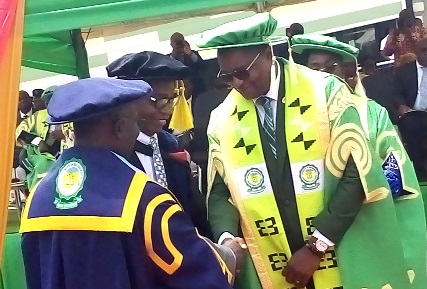
First UESD Vice-Chancellor inducted into office
An Investiture ceremony for the First Vice-Chancellor of the University of Environment and Sustainable Development (UESD), Professor Eric Nyarko-Sampson, and the induction of the first registrar, Mary Abena Agyepong of the same institution, took place at the campus last Friday at Somanya.
In attendance were dignitaries, including academia, Vice-Chancellors of Ghana, chiefs, heads of government institutions, the clergy, among others, who graced the occasion.
The UESD was established by an Act of Parliament (UESD ACT 2015 (ACT 898) and inaugurated on August 5, 2020, by President Nana Addo Dankwa Akuffo-Addo.
It is to be a leading university in the teaching, learning and dissemination of knowledge related to the developments in environment, agriculture, agribusiness and the creation of knowledge through research for national development.
The institution also exists to demonstrate environmental leadership and education through environmental conservation and sustainable environmental practices, build and sustain community partnerships to address local agribusiness and environmental issues, and create a learning environment that fosters sharing of ideas and greater interaction among students and faculty/staff and the promotion of integrity, innovation and freedom of thought.
Core values
The university, with the core values as Honesty, Opportunities, Perseverance and Enterprise, the Chairman of the governing council of UESD, Prof. Jonathan Narh Ayertey, said as the council it was tasked with the arduous task of shepherding the institution in its formative years.
He announced that the council was providing the necessary directions for the management to meet the desired vision and mission.
Prof Ayertey said the council would continue to work hard to give UESD its unique identity and ensure the mandate of the university was met.
He said as stated in section 6 of the enabling Act 898 of 2015, the Council would ensure strategic direction of the university and monitor and evaluate policy implementation.
Prof. Ayertey said there was no basic school and senior high school for the children of the university staff and as such majority of staff had their families outside Somanya “and therefore, have to always rush down to their various families during weekends, a situation which does not augur well for the progress of the university.”
Appeal to government
The Council Chairman appealed to the government to empower the Ministry of Education to assist the university to establish a basic school on the premises for the children of staff.
Also, he further appealed that the university should be considered as one of the STEM universities and adequately resourced to provide that service to prospective students.
“Government should also intensify efforts to provide the university with staff/students accommodation, office equipment and transport facilities,” he further appealed.
For his part, Prof. Nyarko-Sampson said he envisioned to see improvement in the physical infrastructure, asset management and municipal services of the university.
He said phase II of the construction works of the university had begun and was progressing steadily, which comprised two university entrances, a faculty building with lecture halls, offices, libraries and commercial areas, two storey laboratory blocks, staff accommodation, a recreational facility and a two-kilometre asphaltic internal roads.
Commitment
The Deputy Minister for Education, Rev. John Ntim Fordjour, who represented the President said the government was poised to establish five STEM universities in the country to augment the existing ones.
He assured management of the UESD that all its proposals would be given the needed attention for its development as one of the young universities.
